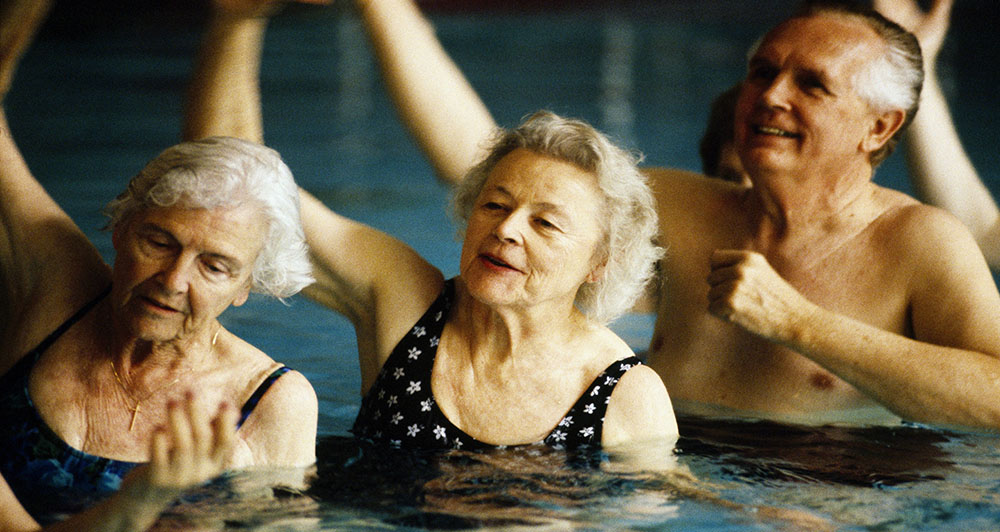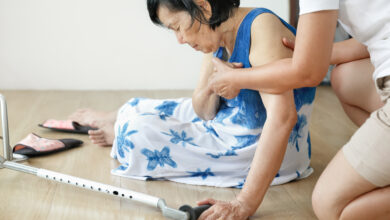Water ways

Nursing professor uses aquatic exercise to help people living with dementia.
There are few meaningful physical activity programs for people with dementia, especially plans that take into account significant disabilities, an academic says. Her solution? A dip in the pool.
Dr Christine Neville, associate professor and head of the School of Nursing and Midwifery at the University of Queensland and president of the Psychogeriatric Nurses Association, co-authored the paper “Physical and Functional Implications of Aquatic Exercise for Nursing Home Residents with Dementia”. The research was published in the journal Geriatric Nursing and looks into outcomes of the aquatic exercise program for individuals with the diagnosis of dementia.
After considering what people enjoy, Neville came to the conclusion that water activities were popular amongst many Australians since childhood and thought it would be ideal to bring back pleasurable memories of local swimming pools or days at the beach.
Neville sheds light on what aquatic exercise programs entail, how they can be run and how barriers to their adoption can be overcome.
NR: What did that aquatic exercise program involve?
CN: What it involved was being mindful that this would take a significant amount of effort from other people involved with the person with dementia. We wanted a program that was dementia specific so we engaged an exercise physiologist to design a program that would be relatively simple and easy for people to understand [and] that it would have some repetitive component. We ran that past a whole group of dementia experts.
This program specifically focuses on improving people’s balance. We also wanted to concentrate on people building their strength or keeping them strong. Also looking at flexibility and agility.
Also, it had to be fun and pleasurable. In the water environment, we got the opportunity because it gives a lot of support to people. They can exercise relatively easy but at the same time it’s quite hard exercise because of the resistance of the water. It’s just a nice environment for people to float around and relax in.
How were the sessions run?
We support the people. We looked at training an instructor in the program. This person not only should be comfortable with conducting group exercises in an aquatic environment but they also had to have a nice manner and good communication skills and be aware some of the disabilities people with dementia suffer [and] be able to communicate in an effective way with those groups of people.
Some people are quite active and mobile … but other people might need what we call a pool pal. They’re people who – very similar to the instructor for the program – lend a hand and are just there as a supportive person. We found that was an effective strategy to get this program up and running and realise the benefits.
We tend to use community pools as well. We thought it was important to use an environment that everyday people go along to and enjoy, so they enjoy getting out of the nursing home for a little while, if that’s where the people live. Certainly, [in terms of] anecdotal feedback, people who participated in our program say to us, “I really enjoyed the break from routine.”
The program goes for 45 minutes. Then there’s some free time to play games or do some laps or swim around and we ask people to do it twice a week, if they can. It’s usually enjoyed over the summer months when most people look to go swim. It depends on what’s available in the environment where the person lives.
How can some of the main barriers to adopting an aquatic exercise program be overcome?
We’ve used groups of volunteers to help out, to drive the nursing home bus down to the local swimming pool and used volunteers from adult swimming clubs to come in and train as pool pals. We’ve also encouraged family members to do this [instead of] just going in the nursing home and sitting there and sort of thinking: Well what are we going to talk about or what are we going to do? This is something they can do together with the person with dementia and it’s also beneficial for them – they get lots of exercise as well.
Your current research focuses on the influence aquatic exercise has on the management of behavioural or psychological symptoms of dementia. What have you discovered about this area so far?
Through our pilot studies … we’ve discovered a decrease in the frequency of the behavioural and psychological symptoms of dementia. We were also able to measure people’s psychological wellbeing and that certainly improved. We got lots of anecdotal reports from staff saying: “When I came on the shift I knew they had been swimming because everybody was sitting around smiling and happy and they slept better that night.”
Email: [email protected]




